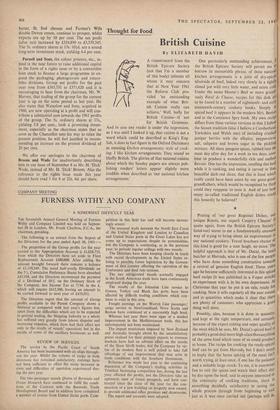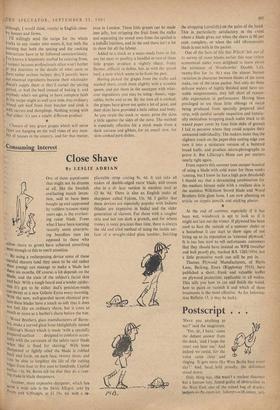Thought for Food
British Cuisine
By ELIZABETH DAVID A COMMUNIQUg from the British Epicure Society (not that I'm a member of this body) informs all whom it may concern that at New Year 1961 the Reform Club pro- vided 'an outstanding example of what Brit- ish Cuisine really can achieve.' Well, bully for British Cuisine—if not for British Grammar. And in case any reader is under the impression, as I was until I looked it up, that cuisine is not a word which could be described as King's Eng- lish, it does in fact figure in the Oxford Dictionary as meaning kitchen arrangements; style of cook- ing. I like kitchen arrangements. They sound so bluffly British. The glories of that national cuisine about which the Sunday papers are always pub- lishing readers' letters appear slightly more credible when described as 'our national kitchen arrangements.' One particularly outstanding achievement, if the British Epicure Society will permit me borrow its memorable phrase, of these national kitchen arrangements is a joint of dry-spiced silverside of beef, baked very slowly in a tightly closed pot with very little water, and eaten cold• Under the name Hunter's Beef or more grand'' osely &cut de Chasse, recipes for this dish are to be found in a number of eighteenth- and earl}' nineteenth-century cookery books. Simply 85 spiced beef it appears in the modern Mrs. Beet( e and in the Constance Spry book. My own recipe differs from these various versions in that I follcg the Sussex tradition (also I believe a Cumberland, Yorkshire and Welsh one) of including crushed juniper berries with the allspice, peppercorns, salt, saltpetre and brown sugar in the picklii mixture. All these pungent spices, rubbed into the meat day after day for a week to ten days, cor • bine to produce a wonderfully rich and mellow' flavour. One has the impression, smelling this beef while it is cooking, and eating it carved in fine, beautiful dark-red slices, that this is food which really could have been eaten by our great-great' grandfathers, which would be recognised by that could they reappear to taste it. And of just boo many so-called traditional English dishes could this honestly be believed?
Prating of 'our great Regional Dishes, oi unique Roasts, our superb Country Cheeses' quote again, from the British Epicure Society hand-out) seems to me a fundamentally unsour way of trying to bring about an improvement our national, cookery. Travel brochure chatter 4 this kind is good for a sour laugh, no more. It helpful approach is that of Mr. Ducat, the het butcher at Harrods, who is one of the few peol, who have done something constructive tower( a revival of genuine English food. Three yea' ago he became sufficiently interested in this spice beef recipe (it was published in a Vogue articli to experiment with it in his own department. Christmas that year he put it on sale, ready ft cooking. Now it sells regularly all the year mull, and in quantities which make it clear that the' are plenty of customers who appreciate a goe thing well done.
Possibly, also, because it is done in quantity, and kept at the right temperature, and certainly because of the expert cutting and super quality of the meat which he uses, Mr. Ducat's spiced beef is probably a good deal more high-class than anything of the same kind which most of us could produce at home. The recipe for cooking the ready-spiced beef can be got from Harrods, but I don't mean to imply that the home spicing of the meat isn't worth trying, at least once, if one has the patience and a suitable large crocks To me, it is enormous fun to mix the spices and watch their effect day by day upon the beef; and to anyone interested in the continuity of cooking traditions, there i5 something decidedly satisfactory in seeing the whole process through from beginning to end just as it was once carried out (perhaps still I' although, I would think, rarely) in English coun- try houses and farms.
I'll willingly send the recipe for the whole works to any reader who wants it, but with the warning that both the spicing and the cooking instructions have to be followed conscientiously.
„ known it hopelessly mulled by catering firms, .1 suspect because professionals often won't bother to pay attention to the details of what seem to them rather archaic recipes: they'll jauntily leave , Out essential ingredients because their wholesaler doesn't supply them or they'll curtail the spicing Period, or boil the beef instead of baking it. and anybody who's not going to have complete faith in the recipe might as well save time, buy ordinary brined salt beef from their butcher and cook it With carrots and dumplings. Nothing wrong with that either, it's lust a totally different product.
Clusters of tiny green grapes which will never ripen are hanging on the wall vines of any num- ber of houses in the country, and for that matter. even in London. These little grapes can be made into jelly, but stripping the fruit from the stalks and separating the sound ones from the spoiled is a tedioris business, and in the end there isn't a lot to show for all the labour.
Added to a stock or a sauce made from or for any fat meat or poultry, a handful or two of these little grapes produce a slightly sharp, fruity flavour, difficult to define, but, as with the spiced beef, a taste which seems to be front the past.
Having picked the grapes from the stalks and washed them, crush them slightly with a wooden spoon, and put them in the saucepan with what- ever ingredients you may be using—bones, vege- tables, herbs and so on. By the time all is cooked, the grapes have given out quite a lot of juice, and their skins have provided a little colour and body. As you strain the stock or sauce, press the skins a little against the sides of the sieve. The method is especially effective for a stock made from a duck carcase- and giblets, for an oxtail stew, for slow-cooked pork dishes.











































 Previous page
Previous page